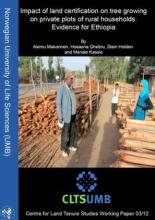/ library resources
Showing items 1 through 9 of 46.This report presents two papers developed in order to study behaviour in trust games in 18 Malawian villages in 2007.
Land tenure remains one of the most critical factors determining equity under REDD+, as we demonstrated through our previous article, ‘Roots of inequity: how the implementation of REDD+ reinforces past injustices”.
Most of the land in sub-Saharan Africa is governed under various forms of customary tenure. Over the past three decades a quiet paradigm shift has been taking place transforming the way such landl is governed.
Hybrid land tenure administration occurs in a number of South Africa’s state-subsidised housing projects and in the informal settlements from which the housing beneficiaries tend to be drawn. Ownership is the tenure form in most of these housing projects.
The extent to which REDD+ initiatives should be a mechanism to address poverty and provide other co-benefits apart from carbon storage, is hotly debated.
Land as an essential resource is becoming increasingly scarce due to population growth. In the case of the Kenyan coast, population pressure causes land cover changes in the Arabuko Sokoke Forest, which is an important habitat for endangered species.
While strengthening women’s land rights is increasingly on national and international agendas, there is little consensus on how to understand women’s tenure security.
Farmland ownership fragmentation is one of the important drivers of land-use changes. It is a process that in its extreme form can essentially limit land management sustainability.
Paginação
Land Library Search
Through our robust search engine, you can search for any item of the over 73,000 highly curated resources in the Land Library.
If you would like to find an overview of what is possible, feel free to peruse the Search Guide.




